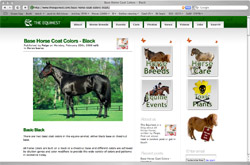Now that you’ve got the basics understood, it’s time to move on to the juicy stuff.
This installment is dedicated to insider tips and important lingo basics.
Pt. 3 is dedicated to even more terminology, specifically types of content and Pt. 4 will offer tools and resources found across the web.
Getting Started
We’ve discussed writing catchy titles, but a successful blog post means more than just a good headline.  Research, terminology and the opening lines of your post are just as important.
Research, terminology and the opening lines of your post are just as important.
The ultimate goal of most websites is to convert sales or get subscriptions, so the first few lines of every post need to be designed to keep your readers on the page and ideally to convert them right away.
More Reading
If you haven’t already read it, check out the first article of this series too Write A Blog Post Pt. 1 – The Basics
 Again I turn to Copyblogger to give you some information on Opening Your Blog Post With A Bang.
Again I turn to Copyblogger to give you some information on Opening Your Blog Post With A Bang.
Another article worth reading before you begin is Seth Godin’s post which offers 56 Ways to Get Traffic to Your Blog. Take a minute to read the comments, there are plenty of resources about the topic there too.
Finally, it is important that you understand How Users Read the Web before you start writing. Because when it comes down to it, people are lazy and they don’t really want to read stuff.
I recommend that every web-based writer read the above article from time to time, because although it is 10 years old it holds as true today as it did the day he wrote it.
The Lingo
Knowing the basic terminology used within the industry will make your job easier no matter what you write.
Blog Post
Blogs can be about anything. There are corporate blogs, animal blogs, political blogs and even blogs about blogging.  Posting on a blog can be as simple as uploading an image or as detailed as the post you are reading right now.
Posting on a blog can be as simple as uploading an image or as detailed as the post you are reading right now.
A blog post can be considered an article or a post. Many businesses hire writers to help them maintain their blogs by writing and posting articles to it.
This can be done in a variety of different writing styles (and called a number of different things), each of which I will define for you later in the series.
You can even make money posting to your own blog using affiliate programs like Google Adwords, but the best money to be made is writing for clients who want quality over quantity.
Article
Although almost every blog post is an article of sorts, not every article is a blog post.  Articles can be used in a number of applications, for ezines, newsletters, in print, for linkbuilding and on blogs.
Articles can be used in a number of applications, for ezines, newsletters, in print, for linkbuilding and on blogs.
Like a blog post an article can be about anything, I’ve written articles about renting horses to taking road trips to plastic surgery.
The concept of articles really began in journalism, articles were written initially to deliver news. Web articles are another animal entirely, however that doesn’t mean you shouldn’t write them about breaking news.
The earlier you catch a story the better.
Keywords
These are the words people use to find you in the search engines.
For example: on my horse site I just wrote a post about black horses, the title is (not at all catchy) Base Horse Coat Colors – Black
Some of the basic keywords for that article would be:

- Horse
- Black
- Base
- Coat
- Color
- Coat colors
- Base coat
- Base colors
- Black base
- Black horse
- Black coat
This is based on the idea that when people are looking for information on black horses they will type something similar to one of the following phrases into a search engine:
- “Black horse color”
- “Horse coat colors”
- “Black horse coat”
- “Black coat base”
- “Black base coat”
- “Base coat colors”
Too many keywords and you end up with spam, which is always to be avoided. However if you want to be found, you have to put yourself out there.
The easiest way to include keywords into your website copy is to write authoritative articles about your industry. This will help people find what they are looking for faster and help the search engines recognize your site for industry-related keywords.
Links
Essentially links are text that navigates to a new page when clicked.The idea is to earn yourself as many incoming links as possible.
 For example: Say I become privy to interesting and brand new information. I write about and post it online, as more people hear about it they begin to look it up and it brings me traffic.
For example: Say I become privy to interesting and brand new information. I write about and post it online, as more people hear about it they begin to look it up and it brings me traffic.
Other bloggers want a piece of that pie without too much work so they write a short paragraph summery and link back to my article. They use my news and supply me with a link as their source.
This is further explained in the next section of the series, however the idea of earning natural links is not just a way to manipulate the system.
Linking to other people within your text (like I do in this article) is not a bad idea, it is a good one. Always give credit where credit is due and you earn respect of those you source.
The below articles are a must read for beginners, they will help you grasp the concept and understand how it is best used to help you (and those you link to).
They are not the bible of links, but the information is well laid out and they are easy to grasp conceptually.
Be sure to read Part 1. The Basics and if you haven’t already, and stay tuned for Parts 3 and 4.





No Comments so far on
Write a Blog Post Pt. 2 – Tips and Lingo